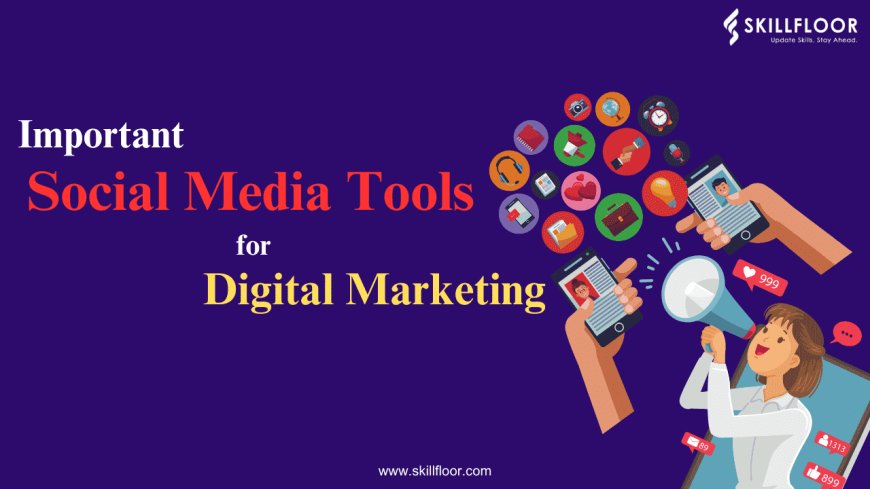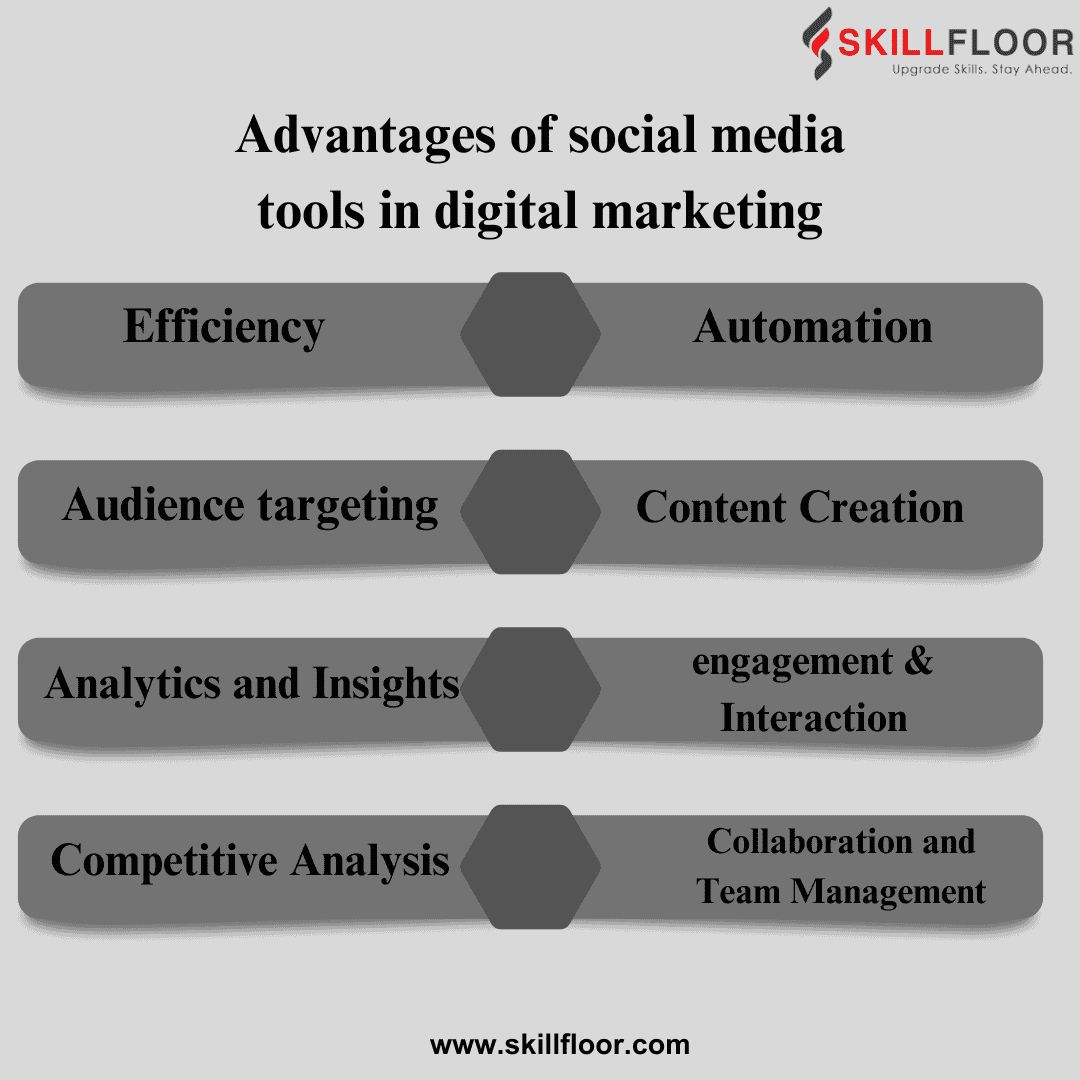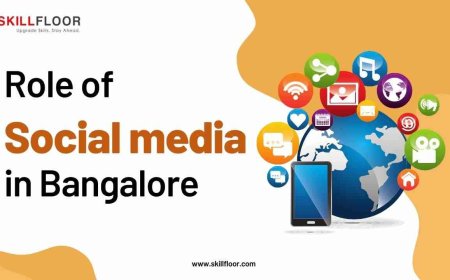Important Social Media Tools for Digital Marketing
Learn about essential social media tools for digital marketing. Improve your online presence with content scheduling, analytics, and management.

Digital marketing the core, of social media, uses a variety of platforms and tools to link companies with their target customers. These social media sites Facebook, Instagram, Twitter, and LinkedIn offer unmatched possibilities for reach and engagement. Marketers can immediately ensure the correct audience sees their content by using advanced keyword targeting options. Social media tools encourage direct interaction between brands and consumers, creating deeper connections that increase brand awareness and loyalty. Furthermore, social media analytics tools offer insightful information about the effectiveness of campaigns and enable real-time improvement based on important parameters like reach, engagement, and conversion rates. Using social media tools and keywords strategically allows organisations to successfully navigate the digital environment, producing measurable outcomes and building the future.
Content is king in today's world of digital marketing, with a focus on interesting video formats and AI-powered personalized experiences. Mobile optimization is a must, and the distinction between social media and online buying is becoming more complicated due to the rapid growth of social commerce. Influencer marketing is built on authenticity, and data privacy laws shape ethical behaviour. Blockchain, AR, and VR are emerging technologies that present new chances for creativity. In the ever-changing digital landscape, marketers must remain adaptable and knowledgeable to engage with their audience effectively.
Challenges that marketers need to overcome to properly use social media:
-
Algorithm Modifications: Social media sites regularly make changes to their algorithms, which has an impact on organic reach. Marketers need to modify their strategies in order to stay visible.
-
Content Saturation: High volume of content makes it challenging to stand out. Marketers need compelling, unique content.
-
Ads Weakness: Users become weary of seeing adverts, which lowers engagement. Advertisers need to improve their targeting and creativity.
-
Measuring ROI: Tracking social media ROI is complex. Marketers need robust analytics tools for accurate measurement.
-
Audience Separation: Targeting is challenging due to the diverse demographics of the audience. Content needs to be properly categorized and customized by marketers.
-
Negative feedback management: Social media makes it possible for unfavorable comments to spread quickly. Marketers require crisis management techniques that work.
-
Platform Changes: Strategies must be adjusted in response to frequent platform modifications. Marketers need to be knowledgeable and flexible.
-
Preserving Authenticity: Sponsored content and influencer marketing damage authenticity. Marketers need to truly align with the ideals of the brand.
-
Data Privacy Concerns: Targeting and personalization are impacted by growing data privacy laws. Marketers have to negotiate legal and ethical challenges.
What is a social media tool?
A software or application created to assist people or companies in managing, evaluating, and optimizing their social media presence is known as a social media tool. A variety of capabilities are usually available with these tools, including the ability to plan and publish content, track interactions and engagement, evaluate performance metrics, and promote teamwork. Social media tools are designed to make managing social media accounts easier, increase productivity, and offer insights that can be used to improve audience engagement and marketing efforts.
Which social media platforms are used in digital marketing?
A wide range of social media marketing tools are at their disposal to assist marketers in managing, evaluating, and optimizing their social media efforts. Here are a few popular ones:
Buffer: Provides data for evaluating effectiveness and enables posting and scheduling across several social media networks.
Hootsuite: Offering scheduling, publishing, and monitoring capabilities for several social media channels, Hootsuite has similarities to Buffer.
Sprout Social: Offers all-inclusive social media management, including features like engagement, scheduling, analytics, and social listening.
Later: With tools like content calendar planning and analytics, this platform focuses on arranging visual content for Instagram, Facebook, Twitter, and Pinterest.
Canva: Provides simple-to-use design tools for producing eye-catching pictures and graphics for social network posts.
Buzz Sumo: Offers insights into competitors' social media techniques and assists in locating popular subjects and interesting content.
Brand Watch: Provides social listening and analytics tools for monitoring sentiment, keeping an eye on brand mentions, and examining audience behavior.
Agorapulse: Offers social media management tools with a focus on community involvement, such as scheduling, tracking, and reporting.
Google Analytics: This tool can monitor user behavior on websites, conversions, and referrals from social media platforms, though not only for social media.
Sprinklr: Provides a single platform for handling social media, customer support, and advertising throughout several platforms and geographical areas.

Advantages of social media tools in digital marketing:
When it comes to digital marketing, social media technologies provide many benefits.
Efficiency: Social media platforms save marketers time and effort by simplifying tasks like content scheduling, uploading, and monitoring.
Analytics and Insights: These technologies give marketers useful information about audience behavior, engagement measurements, and content success. With this information, they can optimize their strategies and make data-driven decisions.
Automation: A lot of social media platforms come with features that let you automate routine tasks like content curation, response management, and post scheduling. This way, marketers can stay consistent online without having to constantly monitor and manage their online presence.
Audience targeting: With the use of social media platforms, marketers may target particular audience segments with customized content and advertisements based on their demographics, interests, and behaviours.
Content Creation: Some social media tools offer built-in design and editing features, making it easier for marketers to create visually appealing and engaging content for their social media posts.
engagement & Interaction: Real-time involvement with followers is made possible by social media management and monitoring tools. This enables marketers to quickly reply to remarks, messages, and mentions from their audience, building stronger bonds with them.
Competitive Analysis: Social media platforms frequently come equipped with tools for keeping an eye on what rivals are up to, comparing one's own performance to that of peers in the same industry, and seeing new trends and business prospects.
Collaboration and Team Management: With the use of collaboration features found in many social media platforms, team members may work together to create, schedule, and analyze content, which speeds up processes and enhances communication.
ROI Tracking: Social media tools give marketers the ability to monitor conversions, assess the effectiveness of their campaigns, and determine the return on investment (ROI) of their social media initiatives. These platforms are equipped with advanced analytics and tracking features.
Integration: To facilitate smooth data sharing and cross-channel optimization, social media networks frequently integrate with other marketing platforms and tools, including email marketing software, CRM systems, and advertising platforms.
To sum up, social media tools are essential to digital marketing because they give advertisers the tools they need to properly monitor, assess, and maximize their social media presence. Numerous advantages are provided by these solutions, such as improved teamwork, more productivity, insightful data, automated possibilities, and accurate audience targeting. Through the smart use of social media platforms, marketers may increase audience engagement, optimize workflows, and more effectively and precisely accomplish their marketing objectives. Using social media platforms wisely is crucial to staying competitive and achieving quantifiable outcomes in today's digital environment, as they are critical channels for communicating with customers.






























































